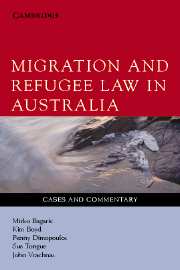Book contents
- Frontmatter
- Contents
- Detailed table of contents
- Table of cases
- Table of statutes
- 1 Thinking about migration law and national borders: An aspirational benchmark?
- 2 Introduction to Australian immigration law
- 3 Family and interdependency visas
- 4 Business and investment and skill-based visas
- 5 Temporary visas
- 6 Miscellaneous visas
- 7 Common visa requirements
- 8 Introduction to Australian refugee law: The Refugees Convention in Australian domestic law
- 9 Convention grounds
- 10 Persecution
- 11 Well-founded fear of persecution
- 12 Limits on protection of refugees: Cessation, exclusion exceptions and protection by another country
- 13 Cancellation of visas
- 14 Judicial review
- 15 Migration and human rights
- Index
15 - Migration and human rights
Published online by Cambridge University Press: 05 June 2012
- Frontmatter
- Contents
- Detailed table of contents
- Table of cases
- Table of statutes
- 1 Thinking about migration law and national borders: An aspirational benchmark?
- 2 Introduction to Australian immigration law
- 3 Family and interdependency visas
- 4 Business and investment and skill-based visas
- 5 Temporary visas
- 6 Miscellaneous visas
- 7 Common visa requirements
- 8 Introduction to Australian refugee law: The Refugees Convention in Australian domestic law
- 9 Convention grounds
- 10 Persecution
- 11 Well-founded fear of persecution
- 12 Limits on protection of refugees: Cessation, exclusion exceptions and protection by another country
- 13 Cancellation of visas
- 14 Judicial review
- 15 Migration and human rights
- Index
Summary
Immigration and refugee law in the context of international human rights law
As we saw in chapters 1 and 2, underlying this study of Australian migration law has been the principle that the decision on who can enter the country is an exercise of national sovereignty. But throughout this book, the close relationship between international law and domestic law has been demonstrated, especially in relation to the granting of protection visas. In this chapter, we are again reminded that Australia's regulation of admission to its territory is done in the context of international instruments that provide standards and guidance. The influence of human rights on immigration and refugee law will be considered. As Australia, and the world, face new challenges such as globalisation, terrorism and environmental changes, international standard setting is expected to become increasingly important.
Human rights are often regarded as the rights a person has simply because they are a human being. They are basic standards that allow a person to live with dignity. People who are forced to flee their homes due to conflict or oppression are obviously likely to be in need of humanrights protections. Immigrants are also vulnerable to exploitation and repression. The Human Rights Manual, published by the Department of Foreign Affairs and Trade, describes the operation of human rights norms.
(The) twin concepts-that only states can be subjects of international law and that the state is sovereign within its own territory and in relation to its nationals-are not especially conducive to the notion that the individual can enjoy rights and privileges under international law independently of the will of their sovereigns. […]
- Type
- Chapter
- Information
- Migration and Refugee Law in AustraliaCases and Commentary, pp. 439 - 494Publisher: Cambridge University PressPrint publication year: 2006



